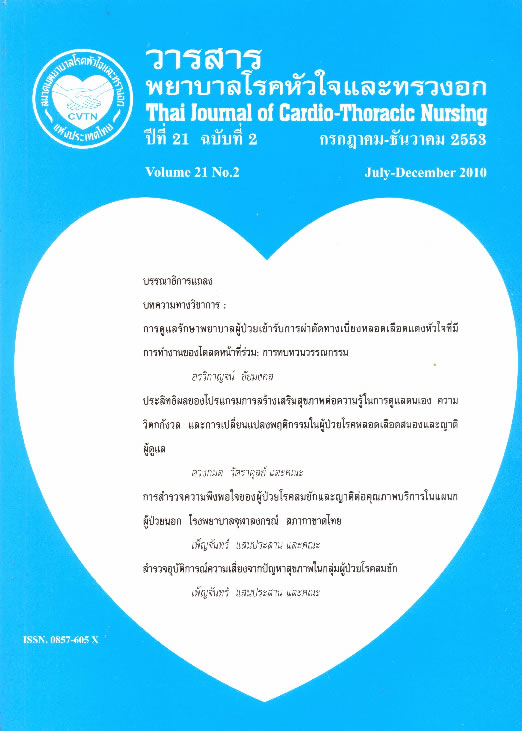การดูแลรักษาพยาบาลผู้ป่วยเข้ารับการผ่าตัดทางเบี่ยงหลอดเลือดแดงหัวใจที่มีการทำงานของไตลดหน้าที่ร่วม : การทบทวนวรรณกรรม
Keywords:
ผู้ป่วยผ่าตัดทางเบี่ยงหลอดเลือดหัวใจ, ไตลดหน้าที่, การจัดการดูแลรักษาพยาบาล, Coronary artery bypass graft, Renal dysfunction, Care managementAbstract
บทคัดย่อ
ผู้ป่วยเข้ารับการผ่าตัดทางเบี่ยงหลอดแดงเลือดหัวใจที่มีภาวะโรคไตลดหน้าที่ ส่งผลให้มีภาวะสุขภาพ ที่ทวีความรุนแรงซับซ้อนทั้งจากความเสี่ยงของโรคหลอดเลือดหัวใจเองร่วมกับโรคไต และส่งผลกระทบต่อ ผลลัพธ์ทางสุขภาพทั้งในด้านอัตราตายและอัตราการเกิดภาวะแทรกซ้อน การวางแผนให้การดูแลรักษาพยาบาลที่มีประสิทธิภาพ จะช่วยพัฒนาผลลัพธ์ที่ดีด้านภาวะสุขภาพ ส่งเสริมการฟื้นตัวของหัวใจและ ป้องกันไม่ให้เกิดการทำงานของไตลดหน้าที่รุนแรงขึ้น
รายงานบทความทางวิชาการครั้งนี้มีวัตถุประสงค์เพื่อทบทวนวรรณกรรมเกี่ยวกับภาวะแทรกซ้อน และการจัดการดูแลผู้ป่วยเข้ารับการผ่าตัดทางเบี่ยงหลอดแดงเลือดหัวใจที่มีโรคไตลดหน้าที่ร่วมที่ไม่ได้เป็น ผู้ป่วยล้างไตมาก่อน ตั้งแต่ระยะเตรียมผ่าตัดและระยะหลังผ่าตัดที่หอผู้ป่วย พยาบาลผู้จัดการรายกรณีควรประเมินผู้ป่วย และค้นหาอาการผิดปกติในระยะแรก เพื่อป้องกันการเกิดภาวะแทรกซ้อนสำคัญ เช่น ไตวาย เฉียบพลันหลังผ่าตัด (Postoperative acute renal failure) ระบบการไหลเวียนโลหิตเปลี่ยนแปลง (Hemodynamic instability) ภาวะเลือดออก (Bleeding) ภาวะขาดสารนํ้าหรือนํ้าเกิน (Fluid volume deficit/ overload) ภาวะขาดสมดุลของอิเล็กโทรลัยต์ (Electrolyte imbalance) ภาวะแทรกซ้อนทางระบบประสาท (Neurological complication) และการติดเชื้อ
พื้นฐานความรู้จากการรายงานบทความทางวิชาการมาจากการศึกษางานวิจัยที่มาจากหลักฐาน เชิงประจักษ์ สามารถนำไปพัฒนาแนวทางปฏิบัติการพยาบาลร่วมกับทีมสหสาขาวิชาชีพ เพื่อใช้เป็น มาตรฐานการดูแลรักษาพยาบาลผู้ป่วยเข้ารับการผ่าตัดทางเบี่ยงหลอดแดงเลือดหัวใจที่มีโรคไตลดหน้าที่ร่วม เพื่อให้เกิดผลลัพธ์สูงสุดด้านภาวะสุขภาพ
คำสำคัญ : ผู้ป่วยผ่าตัดทางเบี่ยงหลอดเลือดหัวใจ, ไตลดหน้าที่, การจัดการดูแลรักษาพยาบาล
Abstract
The health conditions of coronary artery bypass graft (CABG) patients with renal dysfunction are often severe and frequently include complicated health problems. These problems may arise from the disease itself or be associated with co-morbidity illnesses, which affect health outcomes in terms of mortality rate and complications rate. The development of effective care management for patients increases positive health outcomes. It promotes initial recovery of the heart and supports long-term preventive benefits in terms of slowing the progression of renal dysfunction.
This report aimed to review the literature concerning complications in nursing care management for post-CABG patients with renal dysfunction, but excluding dialysis patients. This report included both pre- and post-operative nursing care management in the cardiovascular thoracic ward. Nurse managers should perform proper assessment and early detection of CABG patients to prevent sever complications including post-operative acute renal failure, hemodynamic instability, hemorrhage, fluid volume deficit or overload, electrolyte imbalance, neurological complications, and infection.
Information gained from literature review were taken from evidence based practice can develop practical guideline with multidisciplinary team. These guidelines could be used as standard tools that assisted in the development of nursing care management of CABG patients with renal dysfunction, thus enhancing beneficial health outcomes.
Key Words : Coronary artery bypass graft, Renal dysfunction, Care management
Downloads
How to Cite
Issue
Section
License
บทความนี้ยังไม่เคยตีพิมพ์หรืออยู่ในระหว่างส่งไปตีพิมพ์ในวารสารอื่น ๆ มาก่อน และกองบรรณาธิการขอสงวนสิทธิ์ในการตรวจทาน และแก้ไขต้นฉบับตามเกณฑ์ของวารสาร ในกรณีที่เรื่องของท่านได้ได้รับการตีพิมพ์ในวารสารฉบับนี้ถือว่าเป็น ลิขสิทธิ์ของวารสารพยาบาลโรคหัวใจและทรวงอก






